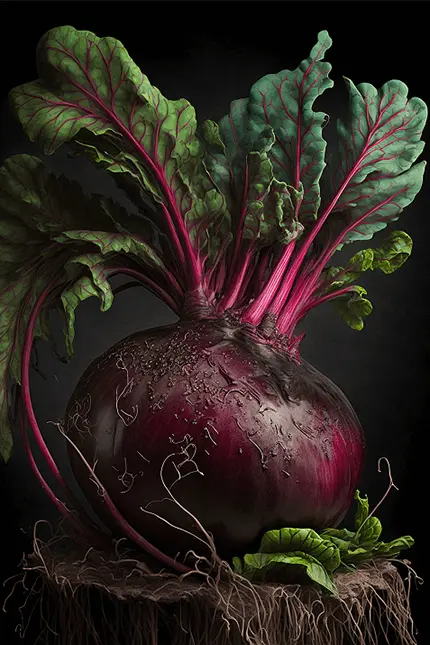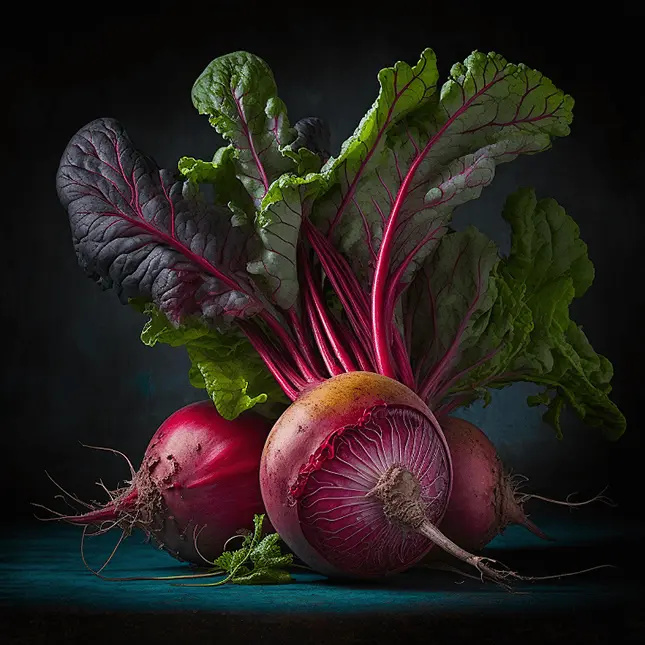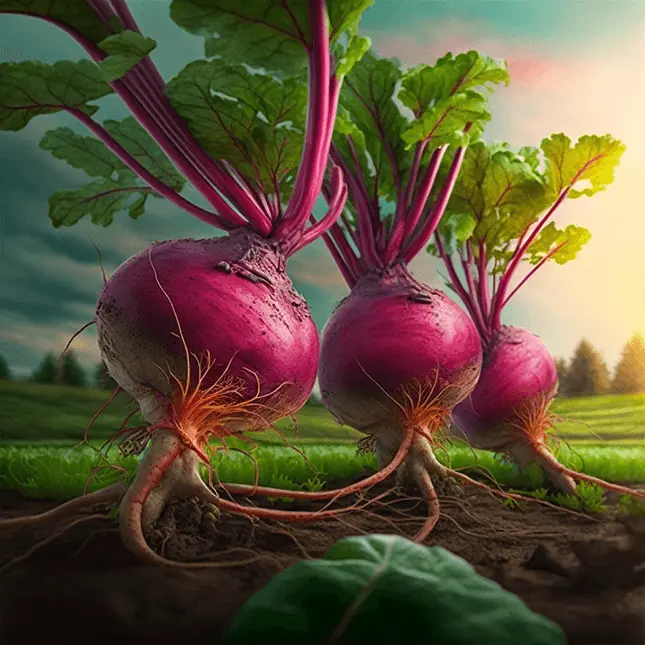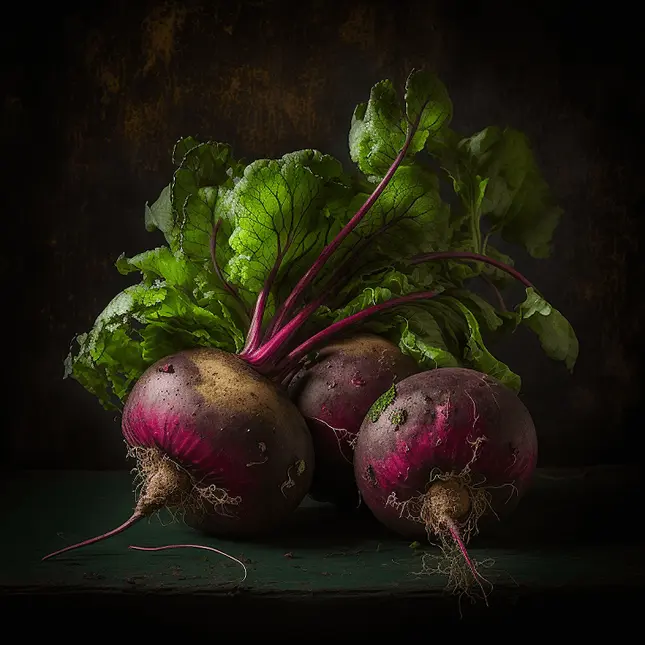Benefits of Beets
Beets have many benefits as well as a rich history of cultivation and use in traditional medicine.
Beets are a nutritious root vegetable that’s high in fiber and low in calories, making them an excellent addition to a healthy weight loss diet.
The fiber in beets can help keep you feeling full and promote healthy digestion.
Beets are also a good source of vitamins and minerals, including folate, potassium, and vitamin C.
Beets contain betalains, which are pigments that give beets their red color and have anti-inflammatory properties.
- March 22, 2023
- Dagmara Mach

BEET BENEFIT SCIENCE

Here are the major nutrients in a 3.5-ounce (100-gram) serving of boiled beetroot (1).
- Calories: 44
- Protein: 1.7 grams
- Fat: 0.2 grams
- Carbs: 10 grams
- Fiber: 2 grams
- Folate: 80 mcg (20% of the DV)
- Manganese: 0.322 mg (14% of the DV)
- Copper: 0.072 mg (8% of the DV)
- Potassium: 245 mg (7% of the DV)
- Magnesium: 24 mg (6% of the DV)
- Vitamin C: 3.6 mg (4% of the DV)
- Vitamin B6: 0.052 mg (4% of the DV)
- Iron: 0.72 mg (4% of the DV)
Note: these are approximations are based on a 2000 calorie adult diet.
Blood Pressure
Beetroot juice concentrate has been found to have positive effects on blood pressure in older adults.
One 2014 study of 24 participants found that after 3 weeks of supplementation, daily systolic blood pressure was reduced by 7.3 mm Hg on average.
However, this effect was not sustained after a 1-week interruption of the beetroot juice supplementation, suggesting that beet juice must be consumed regularly to reap its health benefits on maintaining blood pressure.
A 2018 systematic review of studies found that beet juice supplementation is a cost-effective strategy for reducing blood pressure in different populations.
The review looked at 11 studies published between 2008 and 2018 and found that the nitrate, nitrite, and nitric oxide found in beetroot juice probably contribute to the reduction in blood pressure.
The review suggests that consuming beetroot juice as part of a healthy lifestyle can help to lower the risk of cardiovascular events and decrease the mortality rate associated with hypertension.
Anti-Inflammatory
Beets have been found to have anti-inflammatory properties due to the presence of various phytochemicals such as betalains, flavonoids and other antioxidants.
These compounds have been shown to have anti-inflammatory effects by reducing the production of inflammatory mediators such as prostaglandins and leukotrienes and also by inhibiting the activity of enzymes that promote inflammation.
Some studies have suggested that betalains, which are a type of pigment found in beets, have anti-inflammatory effects by reducing the activity of nuclear factor-kappa B (NF-kB), a transcription factor that plays a key role in the regulation of inflammation.
Betalains have also been shown to inhibit the activity of cyclooxygenase-2 (COX-2), an enzyme that is involved in the production of prostaglandins, which are inflammatory mediators.
Flavonoids and other antioxidants present in beets have also been found to have anti-inflammatory effects by scavenging reactive oxygen species (ROS) and by inhibiting the activity of enzymes such as inducible nitric oxide synthase (iNOS) and cyclooxygenase-2 (COX-2) which are involved in the production of inflammatory mediators.
Beets also contain high levels of nitrates, which when broken down to nitrites and then to nitric oxide, can also have anti-inflammatory effects by dilating blood vessels and reducing the formation of inflammatory mediators.


Physical Endurance And Performance
Beets have been found to have potential benefits for physical endurance and performance due to the presence of nitrates.
Nitrates are compounds that can be converted to nitric oxide (NO) in the body, which can help to improve blood flow and increase the amount of oxygen that reaches the muscles. This can help to improve physical performance and endurance.
Studies have shown that consuming beetroot juice, which is high in nitrates, can improve endurance during exercise.
It has been found that beetroot juice supplementation can increase time to exhaustion, reduce oxygen uptake and reduce blood lactate levels during submaximal exercise. Beetroot juice has been found to be especially beneficial for high-intensity and endurance exercise.
Additionally, Beetroot juice has been found to improve muscle function and power output. There is evidence that consuming nitrates from beetroot juice can cause an increase in muscle power and force, which can help to improve physical performance.
Beetroot juice has also been found to be beneficial for athletes and active individuals.
Beetroot juice supplementation has been found to improve time to exhaustion, reduce oxygen uptake and reduce blood lactate levels during submaximal exercise.
Weight Loss, Digestion And Metabolism
Beets have been found to have potential health benefits when it comes to weight loss, digestion, and metabolism.
Beets are low in calories and high in fiber, making them a good choice for weight loss. The fiber in beets can help to increase feelings of fullness, which can lead to less overall calorie intake.
Beets are also high in nitrates, which have been found to improve blood flow and increase the amount of oxygen that reaches the muscles, which can improve physical performance and help burn more calories during exercise.
Beets have also been found to have potential benefits for digestion.
The fiber in beets can help to promote regular bowel movements and prevent constipation.
Beets also contain prebiotics, which can help to support the growth of beneficial bacteria in the gut, and promote a healthy gut microbiome.
Beets have also been found to have potential benefits for metabolism.
The nitrates in beets can help to improve blood flow and increase the amount of oxygen that reaches the muscles, which can improve physical performance and help burn more calories during exercise.
Beets are also a good source of folate, which is important for the metabolism of macronutrients such as carbohydrates, fats and proteins.


Beets On The Brain
Beets have been found to have potential benefits for brain health, due to the presence of nitrates, antioxidants, and other bioactive compounds.
Nitrates, which are present in beets, can be converted to nitric oxide (NO) in the body. Nitric oxide is a molecule that helps to improve blood flow and can increase the amount of oxygen that reaches the brain. This can help to improve cognitive function and reduce the risk of age-related cognitive decline.
Beets are also a good source of antioxidants, such as betalains, flavonoids and other polyphenols, which can help to protect the brain from damage caused by reactive oxygen species (ROS). These antioxidants can help to reduce inflammation and protect the brain from damage caused by aging and disease.
Additionally, Beets contain high levels of folate and betaine, which have been found to improve the methylation process and protect against cognitive decline. Betaine, has also been found to increase the levels of S-adenosylmethionine (SAMe), which can help to reduce inflammation and improve mood.
Liver Health
Beets have been found to have potential benefits for liver health due to the presence of compounds called betalains. Betalains are a type of pigment found in beets that have been found to have anti-inflammatory and antioxidant properties.
Studies have shown that betalains can help to protect the liver from damage caused by toxins. They can help to reduce inflammation and oxidative stress in the liver, which can help to protect the liver cells from damage. Betalains have also been found to have a hepatoprotective effect, meaning that they can help to protect the liver from damage.
Beetroot consumption has been found to improve liver function and protect the liver from damage caused by toxins, such as alcohol and pollutants. Beetroot consumption has been found to reduce the levels of enzymes that are associated with liver damage, such as alanine aminotransferase (ALT) and aspartate aminotransferase (AST).
Additionally, Beets have also been found to have a detoxifying effect on the liver by helping to remove toxins and harmful substances that have built up in the liver. Beets contain high levels of betalains, which can help to protect the liver from damage caused by toxins, such as alcohol and pollutants.
Skin Health
Beets have been found to have potential benefits for skin health. Beets have been found to have potential benefits for skin health due to the presence of antioxidants and anti-inflammatory compounds.
Beets are a good source of antioxidants such as betalains, flavonoids and other polyphenols, which can help to protect the skin from damage caused by UV radiation, pollution, and other environmental factors.
These antioxidants can help to reduce inflammation and protect the skin from damage caused by aging and disease. Beets are also a good source of Vitamin A and C, which are essential for skin health.
Vitamin A, also known as retinol, is important for the maintenance of skin health and can help to reduce the appearance of fine lines, wrinkles and age spots, as well as promoting a healthy skin barrier function.
Vitamin C, on the other hand, helps in collagen synthesis, a protein that gives structure to the skin, it also acts as an antioxidant and helps to protect the skin from damage caused by UV radiation, pollution and other environmental factors.
Additionally, Beets contain high levels of nitrates, which can help to improve blood flow and increase the amount of oxygen that reaches the skin. This can help to improve skin health and texture.
Kidney Health
Beets have been found to have potential benefits for kidney health. Beets contain high levels of antioxidants and anti-inflammatory compounds that can help to protect the kidneys from damage and reduce the risk of kidney disease.


HISTORY OF BEETS AND THEIR BENEFITS
Beets have been used in traditional medicine for centuries, particularly in Eastern Europe and Asia. Some of the ways that beets have been used in traditional medicine include:
- Treating anemia: Beets are a good source of iron, which can help to treat anemia.
- Detoxifying the liver: Beets contain compounds that can help to detoxify the liver and promote healthy liver function.
- Lowering blood pressure: Beets contain nitrates which can lower blood pressure.
Origins
Beets have a long history of cultivation, dating back to ancient times, it was cultivated by the ancient Romans and Greeks.
Beets were primarily used for medicinal purposes, such as treatment of fever, constipation, and wounds.
In the Middle Ages, beets were grown for their sugar content, which was used for sweetening food and making alcohol. Beets were also used as a food source for livestock.
Today, beets are used in many traditional dishes, such as borscht in Eastern Europe, and in the Middle East, beets are cooked with various seasonings and served as side dishes or dips.

Beets In Nutrition Research
Beets are a popular vegetable for research, due to the presence of nutrients, antioxidants and other beneficial compounds.
Recent studies have shown that beet juice consumption may help reduce blood pressure, improve athletic performance, improve cognitive function and more.
Beets have a long and rich history, both as a food source and as a medicinal plant.
Beet Varieties
Here are some of the most popular varieties of beets grown around the wold today:
- Detroit Dark Red: This is one of the most common varieties of beets found in grocery stores. They have a deep red color and a sweet, earthy flavor.
- Chioggia: These beets have red and white striped flesh and are often used for their ornamental value.
- Golden: Golden beets are similar to red beets in taste, but have a golden-yellow color.
- Albino: Albino beets are white in color and are sometimes called “white beets”.
- Bull’s Blood: This variety of beet is known for its deep red color and is often used for its ornamental value.
- Cylindra: Cylindra beets are long and cylindrical in shape, making them easy to slice.
- Lutz: Lutz beets are known for their large size and long storage ability.
- Touchstone Gold: This is a newer variety of beet that is known for its sweet, smooth taste and golden color.
- Crosby’s Egyptian: This is an heirloom variety of beet that is known for its deep red color and sweet, earthy taste.
These are just a few examples of the many different varieties of beets that are available. Beets can be found in many different shapes and colors, including red, yellow, white and purple, and with different taste from sweet to earthy, spiciness, and more.
Sources
WANT MORE HEALTH & NUTRITION?

HEALTH BENEFITS OF GINGER

